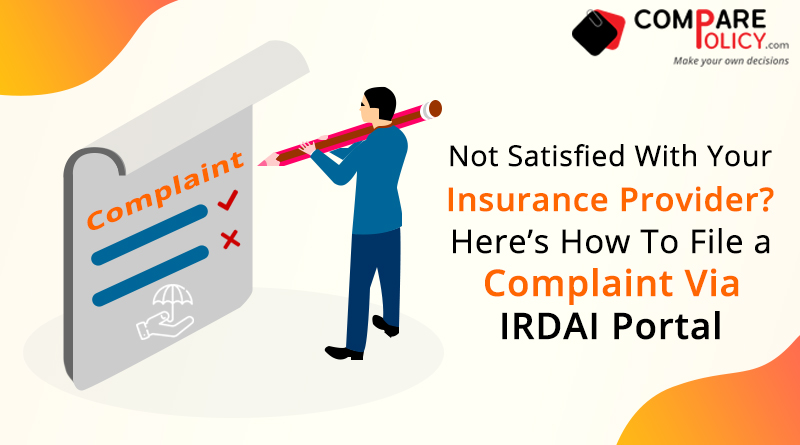Not Satisfied With Your Insurance Provider? File a Complaint via IRDAI
Rajiv Bhatia was happy to take a higher premium policy for a ten-year term when he was told that he could avail of a Rs 10 lakh loan based on this. However, after he paid the first hefty premium, there was a delay in receiving the policy document, and the free-look period lapsed within 15 days. Rajiv did not receive any loan, and he suffered a loss of Rs 1 lakh unnecessarily. File a Complaint via IRDAI is the best way to teach the lesson.
Finding the best term insurance for yourself is quite hard to find, sometimes you met an agent and he started to describe the policy and you said okay to that policy, but before saying yes to that policy you need to know about the policy and you have to do a little bit research. In today’s time, everything that you need to know is available on the internet, it’s like a personal assistant for you it’ll help you to know about the policy and on the internet, you can easily compare all policies of different insurance companies and after you will easily find the best policy.
There are many such cases that happen, regardless of the insurance provider.
Typical complaints include
- Claim rejection on unfair grounds
- Delays in settlement of the claim
- Complaints about handling my claims adjuster
- Mis-selling and misrepresentation
- Wrong policy sold by an agent
- Not receiving the full amount as promised
- Policy not issued by the company
- Policy servicing
- Not aware of the returns offered by the plan
Complaints Redressal
The IRDAI (Insurance Regulatory and Development Authority of India) was set up in 1999 to protect policyholders and regulate, promote and ensure orderly growth of the insurance industry. The Grievance Cell was set up in 2010.
File a Complaint via IRDAI
- “Complaint” or “Grievance” specifically refers to the written expression (including email) of dissatisfaction (by a policy-holder with the insurance company, intermediaries, distribution channels, or other regulated entities) with action or lack of action about standards/deficiencies of service. This doesn’t include inquiries or requests for information.
- The complainant has to first write a complaint to the Grievance Redressal Officer of the insurance company and supporting documents. Get a written acknowledgment of your complaint signed by the concerned officer and a date and time stamp. The insurance company must resolve the complaint within 2 weeks of receipt of the complaint.
- If the complaint is not attended to within 2 weeks by the insurance company, the complainant can escalate to IRDAI.
- Complaints can be made using the IRDAI’s toll-free number, or by emailing them, by registering a complaint on the integrated grievance management system, or by filling the form available on IRDAI’s consumer education section on its website.
- Only complaints from the insured or the claimants are entertained by the IRDAI. It does not accept complaints filed by advocates or agents on behalf of the policyholder. Complaints filed by any other third parties are not accepted.
- The complete details of the complaint must be filled in on the form given on the IRDAI website. Without this information, the complaint may not get registered.
- The complaint is registered with a unique token number, and an acknowledgment of this complaint is sent to the registered email id is provided. Otherwise, the acknowledgment will be sent to the postal address that the policyholder has provided.
- A summary of the complaint is made available on the Integrated Grievance Monitoring System (IGMS), and the documents related to the complaint are captured and forwarded to the insurance company for a resolution of the complaint.
- The insurance company must respond within 2 weeks with an Action Taken update on the IGMS. You can check the status on the website. If you’re satisfied/dissatisfied with the resolution, you must respond within 8 weeks, or the ticket will be closed. If the company doesn’t respond within two weeks, you can escalate to IRDAI.
- Failing all these routes, you can directly approach the Insurance Ombudsman. This is applicable for quick redressal of cases below Rs 20 lakh.

